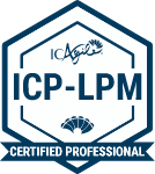ICAgile Lean Portfolio Management (ICP-LPM) (EN)
| Day | Date | Time | Location | Trainer | ||||||
|---|---|---|---|---|---|---|---|---|---|---|
| Fri | 07-11-2025 | 09:00 - 16:30 | Utrecht | |||||||
| Fri | 14-11-2025 | 09:00 - 16:30 | Utrecht | |||||||
What is ICAgile Lean Portfolio Management (ICP-LPM)
ICAgile Lean Portfolio Management (ICP-LPM) is a dynamic framework that helps organizations connect strategy with execution, ensuring continuous value delivery. This training provides an in-depth understanding of lean principles, adaptive planning, governance, and funding models. Participants will explore how to create a flexible and value-driven portfolio, optimize investments, and enable a culture of agility. Through real-world scenarios and interactive exercises, this course equips professionals with the tools to navigate complex portfolio environments and lead enterprise-wide transformation with confidence.
In today’s fast-paced market, organizations need agility at every level—including portfolio management. This training helps professionals develop a lean-agile mindset, optimize resources, and enhance decision-making for better business outcomes. Our experienced trainers bring practical knowledge to theoretical concepts, delivering real-world insights and best practices. By the end of the course, you’ll be equipped with the skills to drive alignment, improve responsiveness, and lead lean portfolio transformations effectively.
Who should attend ICAgile Lean Portfolio Management (ICP-LPM)
This training is ideal for professionals involved in strategy, investment decisions, and agile transformations:
- Portfolio Managers – Ensure strategic alignment and value delivery
- Program Managers – Optimize resource allocation and execution
- Agile Coaches – Support organizations in lean-agile transformations
- Business Leaders – Enhance decision-making and drive business agility
- Product Managers – Align product initiatives with enterprise strategy
- Enterprise Architects – Integrate lean principles into technology roadmaps
- Finance Managers – Adapt funding models to agile environments
- Change Agents – Lead lean-agile adoption at scale
Prerequisites
No formal prerequisites are required, but a basic understanding of Agile frameworks and portfolio management concepts is recommended. Experience in strategic planning, budgeting, or enterprise agility will be beneficial for a deeper understanding.
Objectives
By completing this training, participants will:
- Understand lean-agile portfolio management principles and practices
- Develop strategies for aligning portfolio investments with business goals
- Implement adaptive planning and governance models
- Learn funding approaches that support agility and innovation
- Establish effective portfolio flow and performance metrics
- Drive cultural change to foster business agility at scale
e-CF competences with this course
- A.1. IS and Business Strategy Alignment
- A.10. User Experience
- A.3. Business Plan Development
- A.4. Product/Service Planning
- A.5. Architecture Design
- A.9. Innovating
- E.7. Business Change Management
Classroom, online, blended and in-company
At Capgemini Academy you learn in the way that suits you. Do you prefer classroom training, online or a combination of the two (blended)? You can follow most training courses in-company: within your own organization. We use a variety of tools to make learning even more fun and effective. Consider videos, games, quizzes, webinars and case studies, for example. And you can always contact your trainer with any questions.

In-company training courses
With an in-company training you have several advantages:
- You choose the location.
- You train with your colleagues, ensuring it aligns with your practice.
- The trainer tailors explanations, examples and assignments to your organization.
- In consultation, exercises can be adapted to organization-specific questions.
Request more information or a quote.

